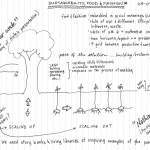
First Findings of the ‘Work-Life Balance and the Pandemic’ Study Amongst University Employees
“Well-being amongst university employees fell between May and September 2020, and increased loneliness and an inability to detach from work accounted for this.” This is a key result from Professor Wood’s study of well-being amongst university employees, academics and non-academics, working at home during the pandemic. Employees completed a diary study over a four-week periods, […]

Scaling Out: Thinking About Sustainability, Food and Fashion
Senior Lecturer in Cultural Production and Consumption at the School, Jennifer Smith Maguire, considers the outgrowths of a recent School based workshop Several years ago I bought a schizostylis coccinea ‘Jennifer’ plant. I was attracted by the promise of autumn colour, and — embarrassing to admit — the cultivar’s name. I hadn’t anticipated the astounding […]
Student-Led Responsible Management Education
This week the School launches its Principles of Responsible Management Education (PRME) student working group. Fabian Frenzel, Lecturer in the Political Economy of Organisation, explains why Founded in 2007, PRME is a UN led initiative which aims to redress the demonstrable lack of care and responsibility taken by managers of increasingly powerful global corporations. It […]
Fighting Corporate Abuse
Martin Parker, Regular Blog Contributor and Professor of Organisation and Culture at the School, explains why management academics like him have an important role to play in the mitigation of corporate excesses Corporations have a very bad reputation. Most ordinary people tend to assume they are gigantic profit making machines that trample on anyone standing […]
How is Ownership at Astra Zeneca Open for Pfizer’s Business?
Ian Clark, Professor of Employment Relations at the School, discusses a controversial contemporary acquisition bid through the concepts of financialisation, ownership and employee relations. Astra Zeneca is the UK’s second largest pharmaceuticals firm: it sells £7 billion worth of drugs every year and contributes 2.3% to total UK exports. The firm employs 51,000 workers globally with 7,000 in […]
Thoresby Colliery and the Art of Minecraft
James Fitchett, Professor of Marketing and Consumer Research at the School, traces the historical evolution of socio-economic illness in a Midlands city UK Coal recently announced the closure of the last remaining coal mines in Britain. The proposal will see the pits face a phased shutdown, with UK Coal’s six surface mines being sold off […]
The Rise of Sustainability Reporting
Michelle Spiteri-Bailey, PhD Student and recent award winning essayist at the School, insists that the rise in Business Ethics and Stakeholder Theory will make accountancy more interesting but also more challenging. Traditionally, the ‘stakeholders’ of a corporation included investors, employees, customers, and suppliers. Nowadays, however, the term ‘stakeholders’ embraces a much wider circle of interested […]
Increasing the Retirement Age won’t solve the Pensions Crisis
Jo Grady, Lecturer in Human Resource Management and Industrial Relations at the School, responds to George Osbourne’s Autumn Statement, particularly on its proposal to increase the retirement age to 70. Speaking on LBC 97.3 today (December 5th, 2013), in defence of the coalition government’s decision to increase the retirement age to 70, Deputy Prime Minister […]
The Marketplace of Life? The Political-Economy of Emergent Water Markets
The frog does not drink up the pond in which he lives (American Indian Saying) In 1776 Adam Smith introduced the paradox of value: diamonds are much more expensive than water, even though water is essential to human survival. Smith’s paradox, at that time, appealed to his contemporaries as little other than a […]

Recent Comments